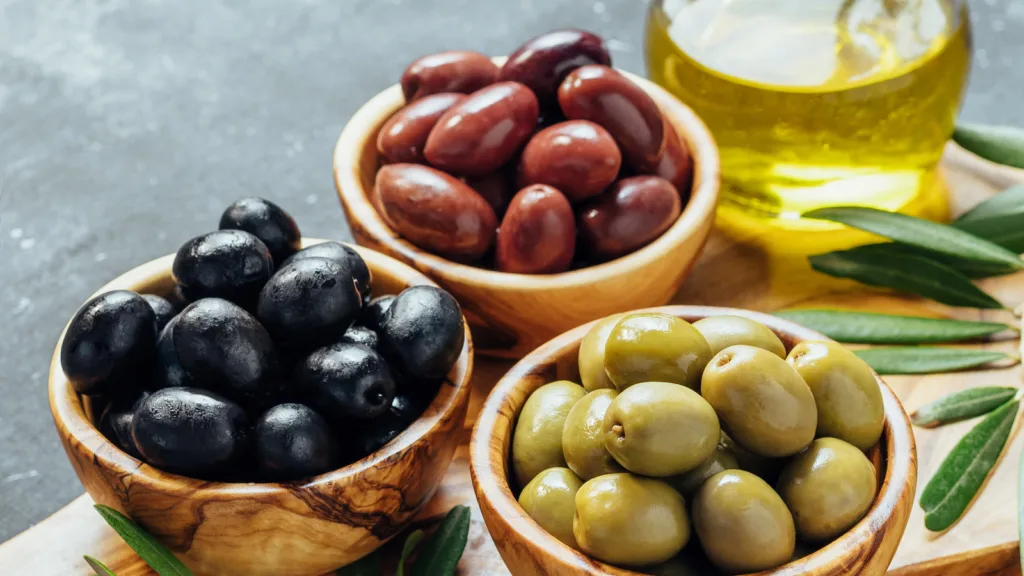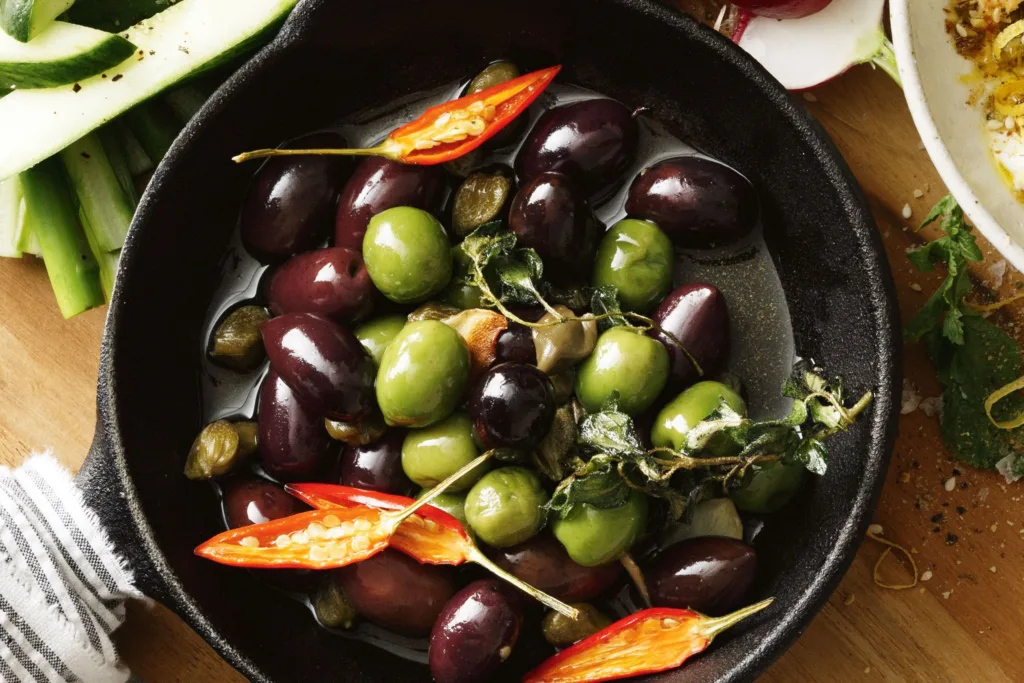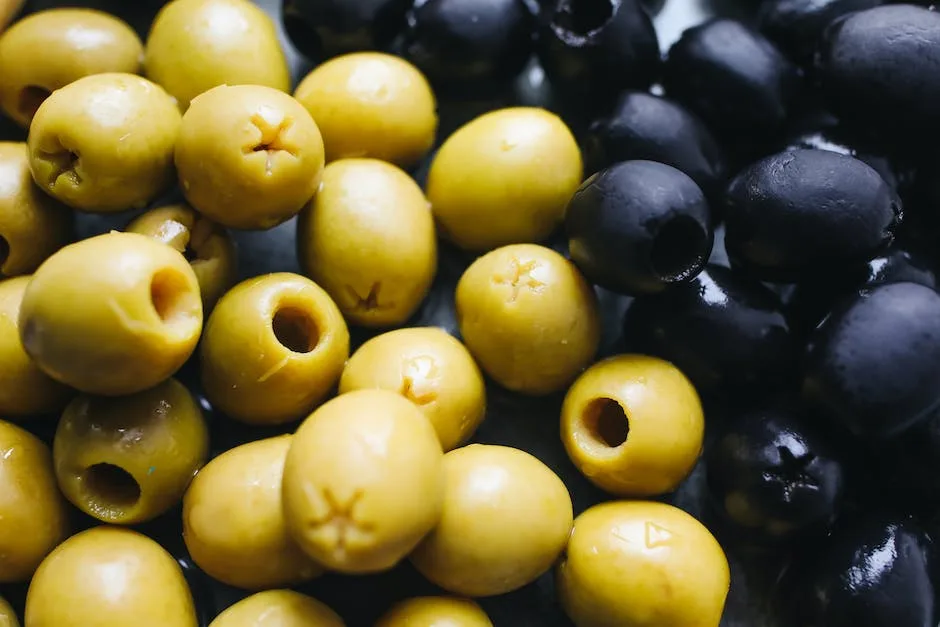The Mediterranean diet has taken the world by storm in recent years, and for good reason. This traditional eating pattern, modeled after the cuisines of Greece, Italy, and other Mediterranean regions, has been linked to a laundry list of health benefits. Most notably, the Mediterranean diet promotes weight loss—and olives may be one of the diet’s secret weapons for slimming down.
Let’s explore the role of olives within the famously healthy Mediterranean diet and their specific benefits related to weight management. By the end of this article, you’ll have the scoop on incorporating olives into your own regimen for excellent weight loss results.

A Diet That Delivers
The Mediterranean diet emphasizes plant-based foods like fruits, vegetables, whole grains, beans, nuts and, you guessed it, olives. Heart-healthy fats like olive oil and fatty fish are also cornerstones of the eating pattern, while red meat and refined carbohydrates make only rare appearances. Wine can be enjoyed in moderation with meals. Essentially, this diet focuses on whole, minimally processed foods that nourish the body.
Study after study confirms that following a traditional Mediterranean diet supports weight loss and maintenance. In one analysis of over 5,500 adults, those who adhered closely to the diet not only lost more weight but also kept it off longer than less diligent dieters. Other research notes the diet’s advantages for reducing belly fat and stimulating fat-burning metabolism.
Beyond weight management, the Mediterranean diet delivers a plethora of benefits. It has been linked to higher longevity, a healthier heart and brain, lower inflammation, and protection against type 2 diabetes, certain cancers, and cognitive decline. It’s easy to see why health-conscious eaters are eager to capture the perks of Mediterranean-style dining!
A Superstar Six-Thousand Years in the Making
Now let’s highlight one especially eye-catching component of the Mediterranean diet: olives! The olive tree traces its roots back over six thousand years to regions along the eastern Mediterranean coast. Historically, olives were prized for the oil extracted from their fruit pulp. Today olives and olive oil remain hallmarks of Mediterranean cuisine, adding flavor and healthy fats to dishes from appetizers to entrees.
There are over two thousand unique olive varieties, ranging dramatically in size, texture, color, and taste. Kalamata olives boast a smooth texture and earthy flavor, while crunchy, bright green Cerignola olives deliver a punch of brightness. Other popular table olive types include Manzanilla, Ligurian, and Picholine olives. With such an array of options, olives can provide pops of color, flavor, and nutrition to any Mediterranean meal or snack.
In the Mediterranean diet, olives act as far more than a Pizza topping or Happy Hour garnish. They are an amazingly versatile ingredient. Large, meaty olives can be stuffed with cheeses, nuts, citrus, or peppers for an explosion of taste. Diced or sliced olives can be mixed into grains, pastas, salads, and more to provide a salty, savory punch. And olive tapenade makes a quick and easy spread for crostini, flatbreads, sandwiches, veggies, or crackers. The possibilities are nearly endless!

The Skinny on Olives
Now that we’ve whet your olive appetite, let’s explore how these gems specifically contribute to weight loss excellence. They are nutritionally dense, providing key vitamins, minerals, antioxidants, and other beneficial plant compounds. But in terms of dropping pounds, olives’ most valuable attributes are their fiber, monounsaturated fatty acids (MUFAs), and ability to boost satiety.
- Fiber aids digestion and keeps you feeling full. Just a 3.5 oz serving of olives offers around 7 grams of dietary fiber—about 25% of the recommended daily value. This fiber content staves off overeating by slowing digestion and promoting satiety signals to the brain.
- The primary fatty acid in olives is oleic acid, a MUFA. Studies associate MUFA intake with smaller waistlines. Unlike unhealthy trans and saturated fats, MUFAs curb appetite hormones, boost metabolism, and activate genes that break down fat.
- The fiber, fat, and fluid volume of olives contribute to satiety—that pleasant sensation of fullness after eating. By keeping you satiated for longer, olives naturally decrease calorie consumption at subsequent meals. Their rich, robust taste also provides satisfaction.
So in a nutshell, olives aid weight loss by reducing overall calorie intake, turning up fat burning, and keeping hunger at bay. Pretty impressive for something found in almost every kitchen!

Bring on the Olives!
If your taste buds are now hungry for olives, here are some tips for incorporating them into daily diet:
- Make olive tapenade and enjoy as a dip with raw veggies or spread on sandwiches. Blend together one cup of pitted Kalamata olives, 1 garlic clove, 2 tbsp capers, 2 tbsp olive oil, 1 tbsp lemon juice and some red pepper flakes.
- Skewer olives along with cubes of cheese, cherry tomatoes, basil leaves and nuts for a Mediterranean appetizer.
- Whip up olive oil based salad dressings and marinades. Mix extra virgin olive oil with balsamic vinegar, Dijon mustard, minced garlic and herbs.
- Add a hearty sprinkle of chopped olives to cauliflower rice, pasta dishes, frittatas, pizza, soups and stews. Anywhere you want a flavor and nutrition boost!
- Snack on a handful of olives when hunger strikes between meals.
Just take care with portion sizes, as olives are calorie-dense. Stick to about 1⁄4 cup daily to keep calories in check. Rinse off any heavy brines or oils, as the excess sodium and fat can have downsides.
With some simple ways to eat more olives, you’re primed to reap their weight loss rewards as part of a Mediterranean diet. Let’s now turn to some exciting scientific research on olives and leanness.
Olives and Weight: Hard Science
Some of the most compelling evidence on olives and weight loss comes from a 2019 clinical trial published in the European Journal of Nutrition. In the study, ninety overweight and obese subjects followed either a Mediterranean diet with 3-4 servings of olives daily or a prudent diet without olives for six weeks. The olive group showed significantly greater reductions in body weight, BMI, waist circumference, and subcutaneous fat. The olives’ high MUFA content was credited with triggering this beneficial effect on body composition.
Additional studies have arrived at similar conclusions. One found that supplementation with an olive leaf extract for eight weeks decreased BMI and lipid levels in subjects with obesity. Another linked higher olive consumption to lower risk of obesity-related cancers like breast cancer. Emerging research suggests phenolic compounds unique to olives may turn on genes and proteins that preferentially store fat in adipose tissue rather than organs. In other words, olives may promote safe fat storage less likely to cause metabolic disturbances.
While more human trials are warranted, the existing evidence overwhelmingly points to olives as weight loss winners. By following a traditional Mediterranean diet rich in olives, you can expect to see your weight heading in the right direction.

Parting Thoughts
As we’ve explored, nutritious and delicious olives deserve a starring role in any Mediterranean diet focused on healthy weight management. They provide ample fiber, healthy fats, and satiety to reduce overall calorie intake. Unique plant compounds found in these fruits offer additional obesity-fighting benefits emerging from human clinical trials. While no one food is a magic bullet for weight loss, olives and olive oil certainly tip the scales toward leanness.
Hopefully this article has kindled inspiration to try olives in new ways and take advantage of their weight regulating potential. Be sure to sign up for our newsletter below for the latest science-backed tips on Mediterranean eating, nutrition, and achieving your health goals. You can also find more of our educational food and wellness content online. Here’s to embracing the Mediterranean lifestyle and bidding unwanted pounds adieu!
Thank you for reading this post, don't forget to subscribe to our free newsletter
!
